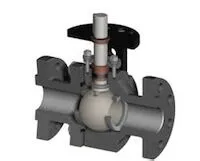Valves Used for the Coal Chemical Industry
Aug 21, 2023
The coal chemical industry refers to the process of using coal as raw material and converting coal into gas, liquid and solid fuels and chemicals through chemical processing. It mainly includes coal gasification, liquefaction, dry distillation, tar processing and the calcium carbide acetylene chemical industry. The chemical structure of organic matter in coal is a macromolecular structure with aromatic-based condensed rings as the unit core, interconnected by bridged bonds, and there are various functional groups. Through thermal processing and catalytic processing, coal can be converted into various fuels and chemicals.
The overall situation of the coal chemical industry
History
The development of the coal chemical industry can be traced back to the 1980s. At that time, there was a shortage of domestic resources, and the government began to give support to the coal chemical industry. In the early 1990s, the domestic market and the petrochemical industry were gradually saturated; China joined the WTO and global competition continued to intensify, and coal chemical companies were gradually forced to improve their technical level. After 2010, while vigorously transforming and upgrading coal chemical companies, they have also continuously strengthened their technology research and development, continuously improved the technical level and reduced costs. In recent years, with the further deepening of China's energy structure adjustment, the coal chemical industry has developed rapidly and has played an important role in China's energy and chemical fields. The development of new processes and technologies in the coal chemical industry poses new challenges to the upstream equipment industry, which also promotes the technological progress of the coal chemical equipment industry.
China's coal resource reserves
The data shows that in 2022, the national raw coal output will be 4.56 billion tons, a year-on-year increase of 10.5%; the national coal import volume will be 293 million tons, a year-on-year decrease of 9.2%; the export of coal will be 4 million tons, a year-on-year increase of 53.7%; the net coal import will be 289 million tons, a year-on-year decrease 9.8%. The national railways have shipped more than 2.68 billion tons of coal, a year-on-year increase of 3.9%; among them, thermal coal shipments were 2.18 billion tons, a year-on-year increase of 8.7%. The domestic coal shipment volume of major ports in China was about 730 million tons, a year-on-year decrease of 1.8%. Among the national reserves and resources, fat coal, coking coal and lean coal account for 14.7% in total, and gas coal accounts for 12.9%. The resources of medium metamorphic bituminous coal with wide applications are relatively scarce, while light bituminous coal has the greatest relative density, among which non-caking coal accounts for 21.6%, long-flame coal about 8.2%, weakly caking coal about 2.6%, and lignite about 12.7%.
Valves used for the coal chemical industry
The coal chemical industry plays a crucial role in the production of various chemicals and fuels derived from coal. This industry heavily relies on valves to ensure the smooth operation of its processes. Valves used in the coal chemical industry are specifically designed to withstand high temperatures, corrosive environments, and abrasive materials.
One type of valve commonly used in this industry is the gate valve. Gate valves are ideal for controlling the flow of materials such as coal slurry, which contains solid particles that can cause wear and tear on other types of valves. These valves provide a tight seal when closed, preventing leakage and ensuring efficient operation. Another important valve used in the coal chemical industry is the globe valve. Globe valves are suitable for regulating fluid flow and controlling pressure within various systems. They offer excellent throttling capabilities, allowing operators to precisely control the flow rate of chemicals during different stages of production. In addition to gate and globe valves, ball valves also find extensive use in this industry. Ball valves have a simple design with a rotating ball inside that controls flow by either blocking or allowing passage through its bore. They are highly resistant to corrosion and can handle high-pressure applications. Overall, valves play an indispensable role in maintaining safety, efficiency, and reliability within the coal chemical industry. Their ability to withstand harsh conditions while providing precise control makes them essential components for successful operations in this sector.
The overall situation of the coal chemical industry
History
The development of the coal chemical industry can be traced back to the 1980s. At that time, there was a shortage of domestic resources, and the government began to give support to the coal chemical industry. In the early 1990s, the domestic market and the petrochemical industry were gradually saturated; China joined the WTO and global competition continued to intensify, and coal chemical companies were gradually forced to improve their technical level. After 2010, while vigorously transforming and upgrading coal chemical companies, they have also continuously strengthened their technology research and development, continuously improved the technical level and reduced costs. In recent years, with the further deepening of China's energy structure adjustment, the coal chemical industry has developed rapidly and has played an important role in China's energy and chemical fields. The development of new processes and technologies in the coal chemical industry poses new challenges to the upstream equipment industry, which also promotes the technological progress of the coal chemical equipment industry.
China's coal resource reserves
The data shows that in 2022, the national raw coal output will be 4.56 billion tons, a year-on-year increase of 10.5%; the national coal import volume will be 293 million tons, a year-on-year decrease of 9.2%; the export of coal will be 4 million tons, a year-on-year increase of 53.7%; the net coal import will be 289 million tons, a year-on-year decrease 9.8%. The national railways have shipped more than 2.68 billion tons of coal, a year-on-year increase of 3.9%; among them, thermal coal shipments were 2.18 billion tons, a year-on-year increase of 8.7%. The domestic coal shipment volume of major ports in China was about 730 million tons, a year-on-year decrease of 1.8%. Among the national reserves and resources, fat coal, coking coal and lean coal account for 14.7% in total, and gas coal accounts for 12.9%. The resources of medium metamorphic bituminous coal with wide applications are relatively scarce, while light bituminous coal has the greatest relative density, among which non-caking coal accounts for 21.6%, long-flame coal about 8.2%, weakly caking coal about 2.6%, and lignite about 12.7%.
Valves used for the coal chemical industry
The coal chemical industry plays a crucial role in the production of various chemicals and fuels derived from coal. This industry heavily relies on valves to ensure the smooth operation of its processes. Valves used in the coal chemical industry are specifically designed to withstand high temperatures, corrosive environments, and abrasive materials.
One type of valve commonly used in this industry is the gate valve. Gate valves are ideal for controlling the flow of materials such as coal slurry, which contains solid particles that can cause wear and tear on other types of valves. These valves provide a tight seal when closed, preventing leakage and ensuring efficient operation. Another important valve used in the coal chemical industry is the globe valve. Globe valves are suitable for regulating fluid flow and controlling pressure within various systems. They offer excellent throttling capabilities, allowing operators to precisely control the flow rate of chemicals during different stages of production. In addition to gate and globe valves, ball valves also find extensive use in this industry. Ball valves have a simple design with a rotating ball inside that controls flow by either blocking or allowing passage through its bore. They are highly resistant to corrosion and can handle high-pressure applications. Overall, valves play an indispensable role in maintaining safety, efficiency, and reliability within the coal chemical industry. Their ability to withstand harsh conditions while providing precise control makes them essential components for successful operations in this sector.
Previous: Selection of Materials and Components of Plug Valves
Next: Development and Applications of Valves for the Coal Chemical Industry


